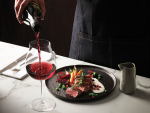OPINION: Each week I receive a newsletter called Areopagus, with ‘seven short lessons’ on various historical figures, classical music, paintings, architecture, rhetoric and writing, finishing with a philosophical question. It’s fascinating.
recent one mused on “the danger of minimalist design, and the death of detail”. Think about what a modern park bench, or a light switch, or even a corporate logo looks like versus the glorious assortment of styles that flourished only 50-80 years ago, and ponder what it was that gave the earlier manifestations their distinctive character. The difference is detail, or rather the increasing lack of it. While the early ethos was for creation of objects with clearly discernible qualities and characteristics, today’s design default is towards ‘small m minimalism’ (not to be confused with ‘capital M Minimalism’, which is a conscious design movement).
This reduction in character smooths identity from things, reducing them to their most basic elements. It also represents safety through inoffensive blandness. Someone might not like a particular detail, so reducing it means the greater likelihood of mass appeal. But it also means a certain removal of personality, of charm, of humanity even. We tend to be struck by, and to remember the objects with more detail and character, even when it’s not to one’s own particular taste. Think of 1950s cars, and their colours, versus 2020s cars; of an Ikea desk versus a Victorian walnut behemoth; a Gothic cathedral versus modern skyscraper. Increasingly we live in a sea of grey boxes and white cars, their personalities smoothed away to assist with resale value.
A while ago I visited Monferrato in Piedmont, and was entranced by the vivid, distinctive local varieties Fresia, Grignolino, Ruche, Dolcetto, Cortese, full of personality and the taste of which rolled off the tongue in the same expressive way their names did. Producers, many with 400 years of production behind them, fretted about being left in the wake of their more glamourous neighbour, Barolo, and wondered if perhaps they should be planting more Merlot, the international grape that was so much easier to say and understand, though to me those actual wines didn’t seem to have much to say.
Last month I was in Alsace. In the 1600s it produced and exported Europe’s most expensive and illustrious wines. It is still a benchmark region for Pinot Gris, Muscat, Gewurztraminer, Riesling, Sylvaner, but all over were producers grappling with varieties and styles that were hard to sell, falling out of fashion, or selling for prices that in no way reflected their quality or the incredible vineyards in which they are grown. We tasted some truly astonishing wines – a 1971 Gewurztraminer as fresh as daisy, a Grand Cru Riesling as profound and delicious as any top Burgundy yet selling at a fraction of its price. Many producers were keen to show us their Pinot Noir, a variety made increasingly viable due to climate change, and on whom Grand Cru status had recently been bestowed. There were some tasty wines but nothing close to as exciting as those from the less fashionable varieties, some of whose own vines may soon be top-grafted into easier-to-sell Pinot Noir.
There are around 10,000 known grape varieties in the world. Just ten of them represent a third of global vineyards; 33 of them cover 50%. The numbers are falling. We are in danger of losing the details of wine, the identities and differences that capture its historical, cultural and environmental uniqueness. The desire to homogenise wine is a sign of our times, in service of mass production and cost reduction, neither of which are inherently bad but deadly when done solely to increase bottom lines, without thought of what we lose. Small m minimalism represents wine’s slide into becoming a ‘beverage’; the death of its detail. I hope we resist it.














